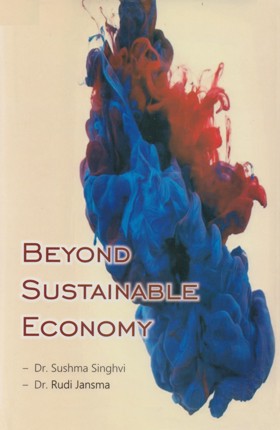By the renunciation of all the desires and ill thoughts of the mind, it is possible to know the soul
(Mahopaniṣad)
In order to eliminate social exploitation and inequality, the wise put forth the solution of proper distribution or equal distribution (saṁvibhāga), and this is mentioned in various philosophies. In India, a number of Vedic and post-Vedic religious approaches arose in which a moral code of conduct included and integrated non-possessiveness.
Veda
The Vedas represent the vast collection of knowledge of the unstinted tradition of Brahmanic culture. The Vedic literature propounds the necessity of non-possessiveness and non-stealing for the general well-being. The responsibility of man has been underlined at the social level: 'pumān pumāṅsaṁ paripātu viśvataḥ (ṛgveda, 8.1.5), that is, 'man should protect all (other) men by all means. For the protection of moral values and duty (dharma) a man should give up greed of even millions.
In the Atharvaveda (11.7.6) it is emphasized that real service to the society is to use what is left over after offering to the needy ones. When people are advised to take their share after first distributing what they can give to the needy, how can one think of hoarding and coveting?
In Vedic culture, the existence of a person or substance is regarded as a part of one total and holistic cosmic existence. The relativistic pair of single and whole 'yat piṇde tat brahmāṇde', 'the single is a part of the whole' points this out. The vision of 'regarding the whole world as a family': 'vasudhaiva kutumbakaṁ' embodies mainly mutual relationship, help, interdependence and friendship. In the ṛgveda it is clearly stated that one who eats alone is regarded a sinner: 'kevalāgho bhavati kevalādī' (10.117.6).
It has been remarked: 'śatahasta samāhara sahasrahasta saṁkira' (Atharvaveda, 3.24.5) that is, be so generous that you should earn with a hundred hands and distribute it in a thousand hands.
Upaniṣads
The Upaniṣads are the conclusions containing the spiritual essence as seen by the sages (ṛṣis) at the end of each of the Veda's, containing the universal truths taught to pupils sitting 'at the feet of their master (upa = nearby, ni =devotedly, sad = sitting down). Traditionally there are 108 upaniṣads, of which 10 or 11 are regarded as the most essential. In the extant Upaniṣads, the significance of truthfulness, non-violence, charity and renunciation has been mentioned. In the Chhāndogya Upaniṣad, for example, sacrifice (yajña), learning (adhyayana) and charity (dāna) are considered as the first supporting pillars (skandha) of duty (dharma).
According to the very first mantra of the Īśopaniṣad everybody and everything in this universe is pervaded by God and is the abode of God, and nothing belongs to anyone and none has ownership of anything, hence there should be distributive justice for anyone's use of everything. The feeling of oneness among all living beings eliminates injustice and that is possible only by practicing non-possessiveness.
In the Kathopaniṣad, Nachiketa told to the God of death (Yamarāja) that man can not be contented by wealth: 'na vittena tarpaṇīyo manuṣyaḥ' (Kaṭhopaniṣad, 2.1.2). When ignoble desires are conquered, the fear of death disappears and man becomes immortal (Kaṭhopaniṣad, 2.3.14).
In the fifth chapter of the Bṛhadāraṇyaka-Upaniṣad (5.2.2), according to one story, Prajāpati, the creator of the universe, when asked about the duty of gods, men and demons, he exhorted the alphabet 'd' (da), which meant that gods should control passions (dama), men should give charity (dāna) and demons should be compassionate (dayā). Here lies the seeds of aparigraha, because the importance of giving was enumerated for men.
Maitreyī (Yajñavalkya's wife) asked, if the whole earth becomes mine by having wealth, can I become immortal by it anyway? Yajñavalkya replied, "No, one can not hope to attain immortality through wealth and enjoyable objects" (Bṛhadāraṇyaka Upaniṣad, 2.4.2). Wealth is not dear for the sake of wealth, it is dear for one's own sake (Bṛhadāraṇyaka Upaniṣad, 2.4.5).
The Mahopaniṣad of the Sāmaveda (2.3-13) remarks that one who gives (distributes) wealth, partakes of the state of Brahma, bliss and wisdom. By the renunciation of all the desires and ill thoughts of the mind, it is possible to know the soul.
In the Muktopaniṣad of the śukla (=White[1]) Yajurveda (2.2), desire for worldly riches (lokavāsanā), desire for fame as a side effect of the study of the scriptures (śāstravāsanā), desire for lust (dehavāsanā) have been regarded as impediments to gaining knowledge and wisdom. All our actions should be done as duty, not as a form of indulging in selfish motives.
The Bhagavad Gitā
The Bhagavad Gītā promotes aparigraha in the form of 'anāsakti', that is, non-attachment. The ideal of the Gītā is not negativism, or escapism or negation of actions, but performance of actions in a non-possessive manner and detached spirit. It is not required to give up action (naiṣkarmya), but the desire, attachment, fruit or self-interest with regard to the action is what has to be given up (niṣkāma karma). Actions are our sphere (rightful duty), not the fruits they bear: 'kamaṇye vādhikāraste mā phaleṣu kadācana' (Bhagavad Gītā, 2.47). Knowledge and action are not really different and opposed, they are one: Sāṅkhyayogau pṛthag bālāḥ pravadanti na paṇḍitāḥ) that is: only fools speak of knowledge (jñāna) and action (karma) as different, not the wise. Knowledge is real, when it comes to practice and action is good when it follows wisdom.
An objection may be raised here that psychologically a person gets motivated for action by some interest or attachment and that dis-attached and absolutely disinterested action is impossible. But this is not true according to the Gītā. Detachment does not mean annihilation of all desires or attachment or possessiveness but the merging of all desires to one supreme desire. Our all actions should be inspired by that supreme desire for our spiritual development. The supreme desire is to protect nature and not to exploit it for selfish motives
 Dr. Rudi Jansma
Dr. Rudi Jansma
 Dr. Sushma Singhvi
Dr. Sushma Singhvi
